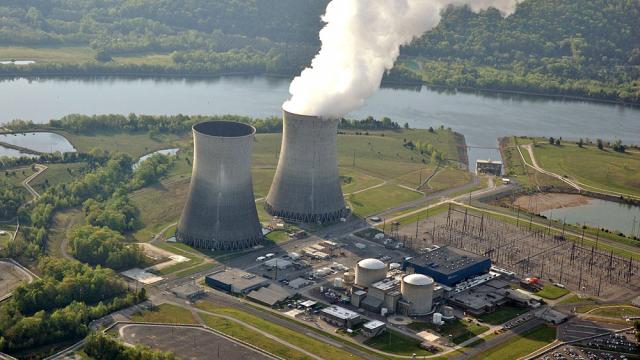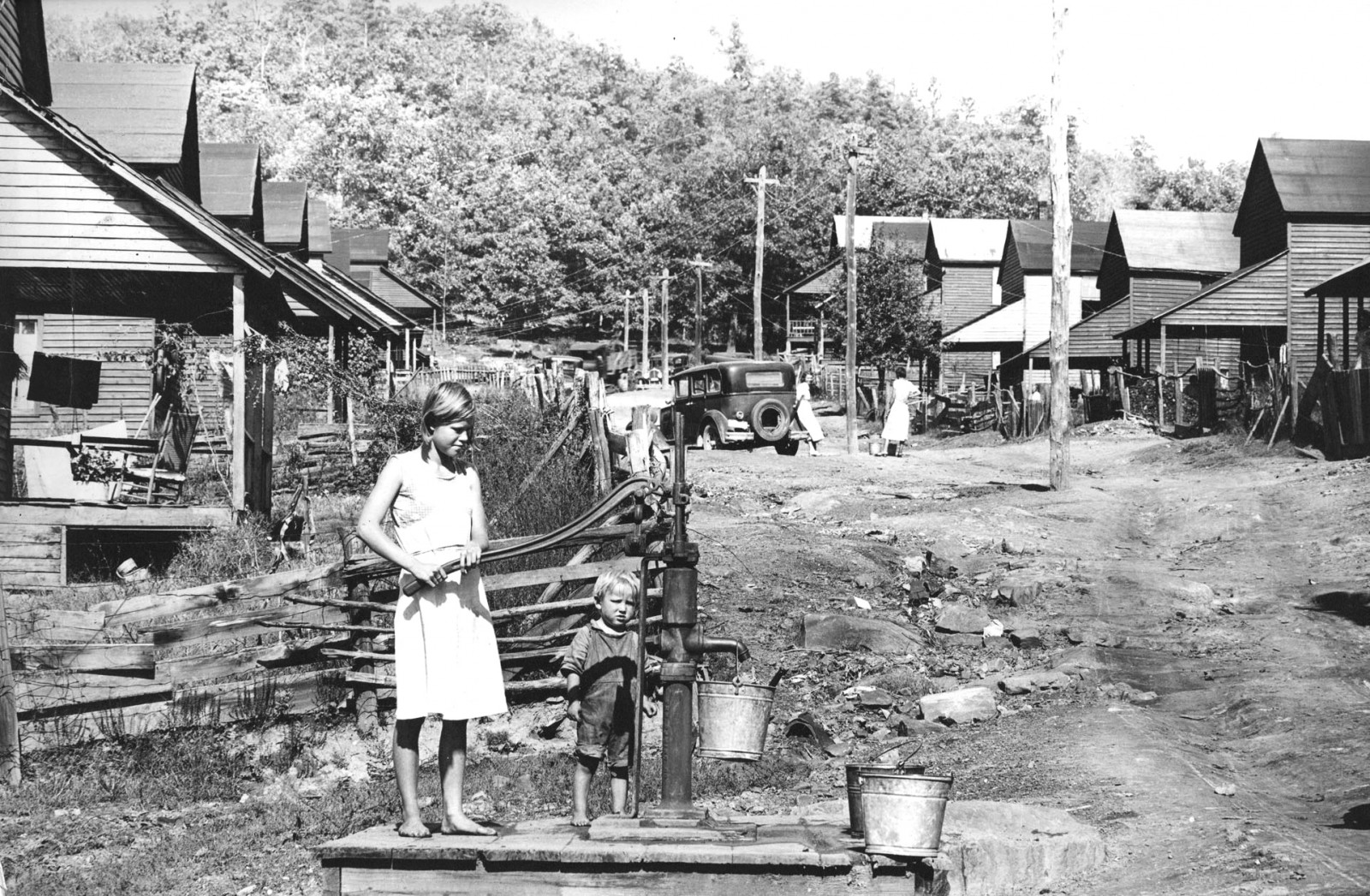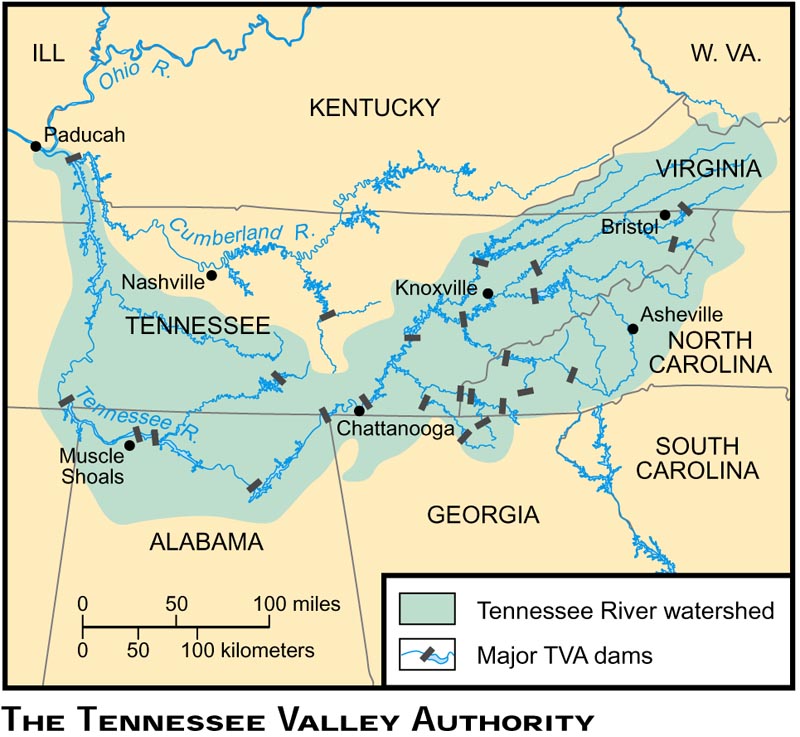
Buried within the fine print of the 2014 Obama budget is a startling bit of history-changing policy. The government, the administration says, should consider selling off the Tennessee Valley Authority, one of the nation’s largest publicly operated—that is, “socialist”—institutions, and the largest public power provider in the country.
The TVA is a non-profi, free-standing public authority established by the Roosevelt administration during the Depression—a very large utility, if you like. It provides 165 billion kilowatt hours of power to 9 million Americans, has $11.2 billion in sales revenue, employs more than 12,500 people, and provides other educational, training and related services (such as navigation and land management, flood control, and economic development) to the people in the states and region around the Tennessee river basin.
Strikingly, it’s the free-market Republicans who object to this proposed privatization. Senator Lamar Alexander, a Tennessee Republican who has vehemently opposed government tax credits and subsidies for renewable energy, calls the proposal “one more bad idea in a budget full of bad ideas,” and fears that privatization would lead to higher energy costs for his constituents.
Congressman John L. Duncan, Jr., another Tennessee Republican, says privatization is “something that has been proposed in the past and been determined to be a very bad idea.” Senator Richard Shelby, Republican of Alabama (a state also served by the TVA), says he will “carefully study any proposals to restructure TVA” in order to make sure that it won’t result in a price hike. And Tennessee’s other Republican Senator, Bob Corker, is clear: “I doubt this idea gains much traction.”
If we didn’t know better, we might think the administration has decided to call the Republicans’ bluff on the issue of “socialism”—a strategy that, however, seems to be beyond the clever quotient of the Obama political team.
The basic problem is that this “socialist” institution is immensely popular. It has given the people of the region good service for roughly eight decades, and its prices are lower than those of many private corporations. An analysis by the U.S. Energy Information Administration found that consumers in Alabama and Tennessee pay considerably less for power than the national average. The low rates, former TVA Chairman S. David Freeman suggests, have earned TVA “the ‘mother love’ of a politically conservative region.”
Even among environmental groups—which often criticize the TVA for, among other things, its continued use of coal and nuclear power plants—there is little appetite for privatization. The Tennessee chapter of the Sierra Club holds that privatization would be a mistake, potentially allowing new private corporate owners to “liquidate its assets by selling off TVA’s public lands along the Tennessee River and tributaries.”
So why is the Obama administration pursuing a sell-off? Mainly for short-sighted budget appearances. Privatizing public assets like the TVA will generate some near-term revenue and help pay down a (very) small fraction of the nation’s debt. The White House also claims the TVA will likely have to issue more debt securities in the future in order to raise money to modernize its aging infrastructure, which would—in a purely accounting sense—slightly increase the deficit. This is an odd worry, since the TVA is, and would continue to be, entirely self-funded at no cost to the taxpayer, and the new debt is simply to finance the kind of updating and modernizing any major corporation routinely does.
Most Americans do not realize that public ownership like that involved in the TVA, and a cornerstone of much decried “socialism,” can be found in communities in every state in the nation. For one thing, there are more than 2,000 public electric utilities—many in conservative rural areas—and, like the TVA, they are popular among local residents and politicians. Successful public ownership of vital transportation facilities (such as roads, ports and airports) is also common. And, of course, roughly a third of the nation’s total land surface (and the minerals beneath and forests above) is owned and managed by the government.
Around the world, there are also thousands of highly successful examples of so-called socialism like the TVA. Public enterprises operate advanced high-speed rail networks in many countries. Public ownership of significant or controlling shares of airlines is also common. More than 200 public and semi-public banks, along with over 80 funding agencies, account for a fifth of all bank assets in the European Union. Faster and more widely available Internet access is provided in many countries where public corporations exist side by side with private companies, and public telecommunications companies are also common around the world.
Most Americans are clearly not nearly as ready as citizens of other countries to think about public ownership at this scale—or even at the scale of the TVA. On the other hand, stranger things have happened. Possibly one day the United States might catch up with the kinds of practical things being done in many parts of the world—or even, for that matter, with what Republicans representing areas served by the Tennessee Valley Authority think makes sense.
Originally published by AlterNet
3 WAYS TO SHOW YOUR SUPPORT
- Log in to post comments

















